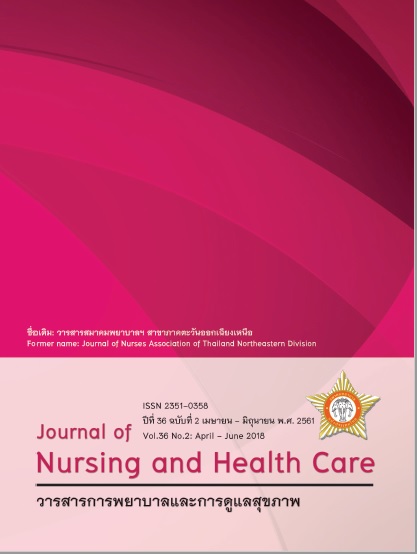การพัฒนากระบวนการเรียนรู้ชุมชนสู่การดูแลแบบหุ้นส่วนเพื่อลดการสัมผัสควันบุหรี่ที่บ้านของวัยแรงงานที่เป็นเบาหวาน Community Learning Process Development in Creating Family Partnershipto Minimize Cigarette Smoke Exposure at Home for Informal Workers with Dia
คำสำคัญ:
community partnership, minimize cigarette smoke exposure at home, informal workers with diabetes mellitus,บทคัดย่อ
Smoking is a major public health problem and it is a silent threat to health, affecting all individuals at all levels. This Participatory Action Research (PAR) aimed to develop the learning process creating community partnership to minimize cigarette smoke exposure of informal workers with diabetes mellitus. This PAR was conducted in 9 communities of Muang District, Khonkaen Province. There were two cycles of intervention, each of which included four phases: 1) situation assessment of cigarette smoke exposure via focus group discussion, in-depth interviews; 2) planning and development of operational tools by setting up guidelines and creating community partnership by means of brainstorming and recruiting model families; 3) developing community partners to follow the guideline for minimizing cigarette smoke exposure and to provide support between village health volunteers, community leaders, health promoting personnel and families; and 4) evaluation through after action review and reflection on performances of research participants including 130 smoking informal workers with DM together with one member from each family, 90 village health volunteers and community leaders, and 5 representatives of health promoting hospitals. Content analysis was applied with qualitative data while descriptive statistics were used with the quantitative.
The study found that before the intervention, 70 percent of 130 families with smoking work-force aged smokers that participated in this study were exposed to cigarette smoke on the daily basis both at home and from their neighbors. These family membershad tried without success to minimize their exposure to cigarette smoke informal workers with DM did not quit smoking. After learning with their family members from focus group sessions by means of sharing experiences, thinking reflectively, the communities developed partnership for care-giving and support: 1) looking for amodel family to learn from; 2) compromising attitudes towards cigarette smoke and its effects on DM.; 3) talking heart-to-heartto create to awareness on smoking ; and 4) making household’s rules to save family members from cigarette smoke and to live together supportively.
The results were changes in every family of informal worker with DM; 1) the shared learning process helped create warm and pressure-free discussions; 2) integration of experiences from model families and household agreements helped improve care providing skills, motivation, smoking cessation consultation to form a guideline for tobacco-free, supportive living, 3) the development of neighborhood rules to bring about the smoke-free zone at home; and 4) fourteen families could reduce the number



